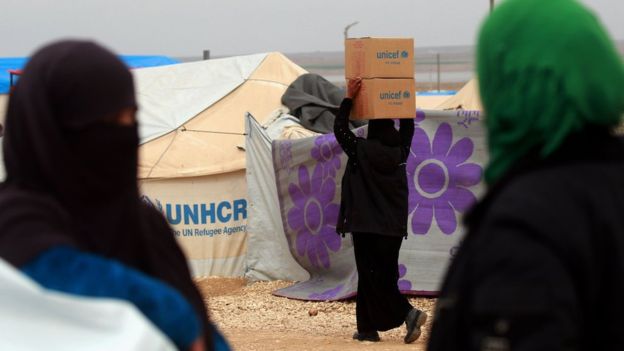Women in Syria have been sexually exploited by men delivering aid on behalf of the UN and international charities, the BBC has reported.
Aid workers said the men would trade food and lifts for sexual favours.
Despite warnings about the abuse three years ago, a new report shows it is continuing in the south of the country.
UN agencies and charities said they had zero tolerance of exploitation and were not aware of any cases of abuse by partner organizations in the region.
Aid workers told the BBC that the exploitation is so widespread that some Syrian women are refusing to go to distribution centers because people would assume they had offered their bodies for the aid they brought home.
One worker claimed that some humanitarian agencies were turning a blind eye to the exploitation because using third parties and local officials was the only way of getting aid into dangerous parts of Syria that international staff could not access.
The United Nations Population Fund (UNFPA) conducted an assessment of gender-based violence in the region last year and concluded that humanitarian assistance was being exchanged for sex in various governorates in Syria.
The report, entitled "Voices from Syria 2018", said: "Examples were given of women or girls marrying officials for a short period of time for 'sexual services' in order to receive meals; distributors asking for telephone numbers of women and girls; giving them lifts to their houses 'to take something in return' or obtaining distributions 'in exchange for a visit to her home' or 'in exchange for services, such as spending a night with them'."
It added: "Women and girls 'without male protectors', such as widows and divorcees as well as female IDPs (Internally Displaced Persons), were regarded as particularly vulnerable to sexual exploitation."
Yet this exploitation was first reported three years ago. Danielle Spencer, a humanitarian adviser working for a charity, heard about the allegations from a group of Syrian women in a refugee camp in Jordan in March 2015.
She conducted a focus group with some of these women who told her how men from local councils in areas such as Dara'a and Quneitra had offered them aid for sex.
"They were withholding aid that had been delivered and then using these women for sex," Ms Spencer said.
"Some had experienced it themselves, some were very distraught.
"I remember one woman crying in the room and she was very upset about what she had experienced. Women and girls need to be protected when they are trying to receive food and soap and basic items to live. The last thing you need is a man who you're supposed to trust and supposed to be receiving aid from, then asking you to have sex with him and withholding aid from you."
She continued: "It was so endemic that they couldn't actually go without being stigmatized. It was assumed that if you go to these distributions, that you will have performed some kind of sexual act in return for aid."
A few months later, in June 2015, the International Rescue Committee (IRC) surveyed 190 women and girls in Dara'a and Quneitra. Its report suggested about 40% had said sexual violence took place when they were accessing services, including humanitarian aid.
An IRC spokesman said: "The assessment concluded that sexual violence was a widespread concern, including when seeking access to various types of services across southern Syria. These services included the distribution of humanitarian aid."
The reports - both of which have been seen by the BBC - were presented at a meeting of UN agencies and international charities hosted by the UNPFA in the Jordanian capital, Amman, on 15 July 2015.
As a result of this meeting, some aid agencies tightened up their procedures.
The IRC said: "Within our own operations, we launched new programmes and systems to better protect women and girls in southern Syria. Those programmes continue to be funded by a range of donors, including DfID (the UK's Department for International Development)."





